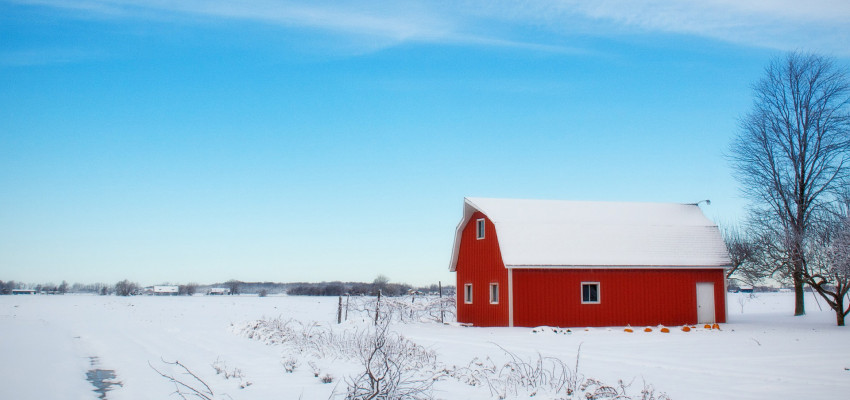By Hannah Becker on November 14, 2016
Winter on the farm

While the winter months may conjure up images of mistletoe, Christmas cookies and holiday shopping in the minds of some, the impending cooler temperatures take on a very different meaning to Kansas farmers.
Preparing equipment for spring planting and supplementing livestock’s diets with grain and hay are just a few of the many winter chores that may top today’s farmer’s to-do-lists.
Here are four ways Kansas farmers work to prepare their farm for the winter season:
Animal Care
Winter weather presents unique challenges to caring for farm animals; farmers must care for their animals every day, regardless of how harsh the weather is outside. Cold weather husbandry chores can include: feeding grain, breaking ice in water troughs, maintaining generators, setting out hay, monitoring herds for signs of stress and cleaning manure out of animal shelters. Preparing for winter storms is another concern for Kansas farmers; keeping extra feed and supplies on-hand in case rural roads become impassable during snowstorms is always a good idea.
Budgeting and Planning
Most farming operations have seasonal revenue, meaning they only receive income at certain times of the year – when their crops and livestock “go to market.” Managing such seasonal income requires careful budgeting; farmers must plan all expenses until the next harvest season to ensure their farm will have adequate resources to operate throughout the year. The winter season provides farmers with the perfect opportunity to fiscally prepare for the next growing season.
Continuing Education
Like many professions, farmers prioritize continuing education, and the winter schedule provides an opportune time to schedule agricultural conferences, industry trade shows and other educational events. In Kansas, a few of the exciting farm-focused events that occur during the winter include: Kansas Farm Bureau’s Annual Meeting, Women Managing the Farm Conference and Young Farmers & Ranchers Leaders Conference. These educational opportunities provide farmers the chance to learn, share and connect with other agricultural leaders.
Equipment Maintenance
Many farmers work on farm equipment, like tractors and implements, and update their facilities, like barns and fences, during the winter months. Even if there’s snow on the ground, many maintenance chores and routine repairs can be made inside a barn or shop. On our farm, replacing the stock trailer floor, restringing our perimeter fence and updating our catch pen are just a few of the “winter projects” outlined on our to-do lists. The secret to working all day in the winter elements includes warm coveralls and hand warmers.
Just because you don’t see tractors in the field, doesn’t mean farmers are getting to enjoy a holiday break. Winter weather requires Kansas farmers to adapt their schedules and priorities to the challenging elements and prepare their operation for the next year. By caring for animals, budgeting for the upcoming seasons, participating in continuing education and completing equipment maintenance and repairs, farmers can ensure our communities will continue to enjoy their agriculture products for years to come.


